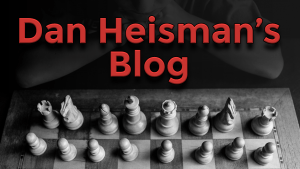Q&A with Coach Heisman Feb 21, 2014
"I get really nervous during important games; what should I do?"
"I get really worried about my rating. Do you have any suggestions?"
I think these two questions, while undoubtedly different, are in some senses closely related. As I have noted, if they had never invented the rating system - or at least not emphasized it so much for pairing and prizes, the way many people view chess, positions, and outcomes would be vastly different (refer to the links Encouraging Tournament Participation [starting at the bottom of the page] and Don't Fall Into the Improving Scholastic Player's Rating Trap).
The first thing to remember is "Rating is just a reflection of playing strength! Don't worry about your rating; worry about your playing strength and your rating will inevitably follow." So, unless you want to artificially inflate your rating with a fantastic event (or illegally paying someone to throw a few games) and then retire forever with that inflated rating for some psychological reason, what's the point of going for a rating higher than your strength? Doens't make sense. Just work on your playing strength.
If you have a good or bad tournament and your rating moves too much away from your strength, it will inevitably return. And if you improve, then your rating will inevitably go up. No sense trying to manipulate your rating by, say, offering draws to better players in winning positions just to ensure a few points. Play for a win and learn something - and get LOTS more points (not just double) if you succeed.
To be fair, much nervousness is not related to the rating system. The two main types of nervousness are:
- Competition - this is the ancient adrenaline used for fight or flight. If you are not at least a little hyped up about competing, that's not normal, and
- Newness of activity - just like you are nervous the first few weeks of a new school or a new job, if you are not used to playing in clubs or tournaments, then when you first do, it takes a while to be acclimated.
But the questioner mentioned a third type of nervousness - the type you get in a "big" game - one that helps decide a title or championship or large prize. I've always done fairly well in those situations, not because I have nerves of steel, but because I get engrossed in each position. I mostly view my role as puzzle solver - What's the best move I can play in a reasonable amount of time in this position? (refer to the link The Goal Each Move).
If you do this against everyone in every position, and in doing so not play too slow or too fast (refer to the link The Goldilocks Principle), then you should achieve the "after-game" goal: to be able to look yourself in the mirror and say "I tried my best; there's nothing more I could have done." If you can do that, then there's less reason to be nervous.
Sure, when lots of money or a national title is on the line that's not so easy, but experience is a good teacher. Once you've done it a few times, you either get used to it, or let it negatively affect you. Of course, doing the little things to help prepare for those games like getting enough sleep, eating well, and preparing solidly for the event should lessen the chances that the pressure will get to you.
In the long run, no words I can write or say will take all the pressure off, but the perception is key. US President Franklin Delano Roosevelt once said "The only thing we have to fear is fear itself" but of course he only had 2.5/6 going into the final round  .
.
"What's an easy opening for a beginner to learn?"
This is always a tough question. In a sense you want beginners to learn tactics, so the traditional advice of playing the natural 1.e4 e5 is quite good. On the other hand, I have to admit it's not the easiest opening to learn, so there is a difference between easy openings to learn and the ones where you learn the most.
During the show I mentioned that The London System (1.d4 Nf6 2.Bf4 or 1.d4 d5 2.Bf4) was an easy opening to learn. It does't promise White a big advantage, but it helps you get all your pieces out and there's not a lot of book lines and traps to worry about. It's not so easy to find a comparable line for Black; having the second move means that you have to fight a little for position and doing so requires a little more knowledge to keep the game on an even keel.
This leads to one of my "observations": the better the reputation of a line and the more popular, then the more book knowledge is available (and usually required). Of course, that's not what the requesters want: they want an opening that's really easy and promising that does not have a lot of book, but that turns out to be an oxymoron. If you want the good stuff, then so does everyone else and there's usually more to learn.
Nevertheless, there are many solid openings that are not quite as booky or popular that still offer chances. During the show I mentioned that for Black one might be the Kan Variation of the Sicilian Defense (1.e4 c5 2.Nf3 e6 3.d4 cxd4 4.Nxd4 a6) as one.
Aside: if you are a beginner, please don't blindly play the same Black moves if White does not play this exact sequence! I see this mistake all the time: a beginners learns the Black moves in an Open Sicilian (when White plays 2.Nf3 and 3.d4), but then they play those same Black's moves when White plays a non-open (Anti-Sicilian)! This can result in anything from a silly to disastrous result, depending on what both players are playing (refer to the link Openings vs Opening Systems). For example, after 1.e4 c5 2.Nc3 the main move is 2...Nc6, although the "Kan" move 2...e6 also (luckily) works after 2.Nc3 as well. But don't think you are playing a Kan if White doesn't play (or transpose to) 2.Nf3 and 3.d4  .
.
---------------------------
Penn State's Fight against Breast Cancer will be supporting an online charitable auction via www.charitybuzz.com Proceeds fund breast cancer research and educational programs at Mount Nittany Medical Center, Penn State Hershey Cancer Institute, PA Breast Cancer Coalition, the Kay Yow/WBCA Cancer Fund and J.C. Blair Memorial Hospital. Thanks to permission from Chess.com, we are now auctioning off a guest appearance on "Q&A with Coach Heisman" for this cause. The winner will be invited to my home in Wynnewood, PA, to be a guest on a future show. To see the auction or bid (the auction is live til Feb 27) take this link. The first bid is $100. Although I am volunteering to host this 90 minute guest appearance, I will also throw in some other goodies for an appropriately high winning bid - the appearance is valued at $500 .
.

